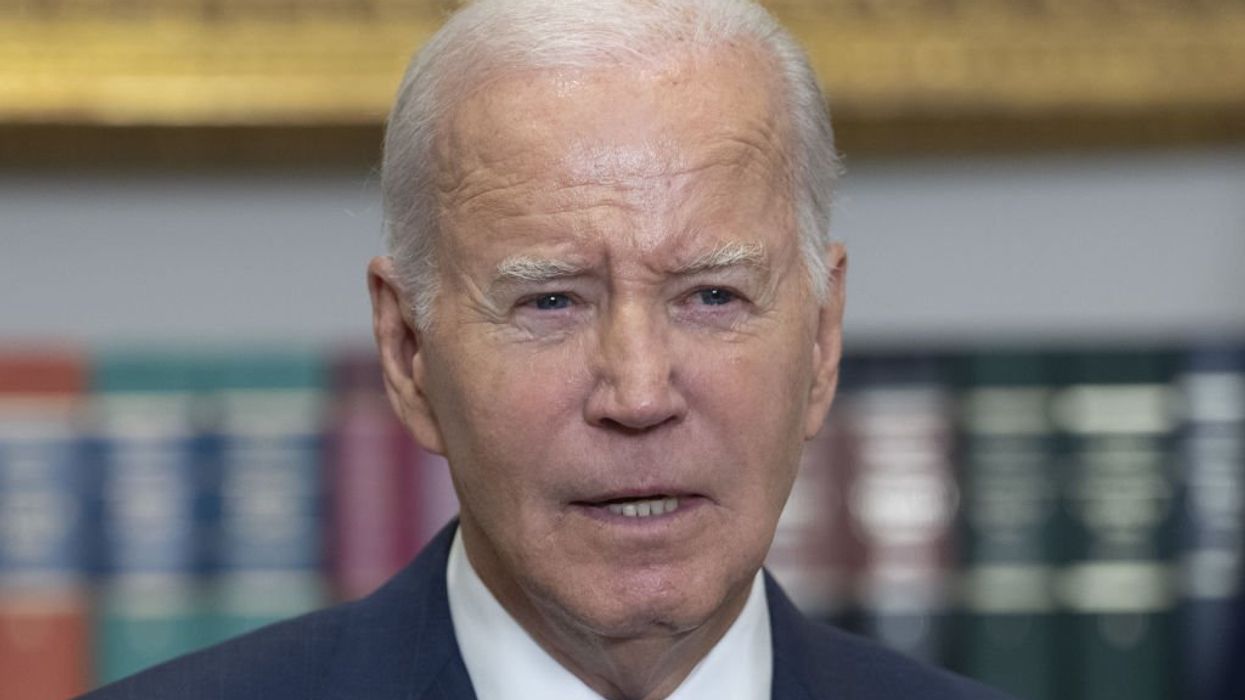
Chris Kleponis/CNP/Bloomberg via Getty Images

A Pentagon-funded study has highlighted how geriatric government officials' mental degeneration could pose a risk to national and global security.
The RAND Corporation's National Security Research Division noted in a report published earlier this year that as a consequence of people living longer and working later in life, "the workforce might experience a higher prevalence of dementia than in past generations."
"Taken together, we believe that an increasing number of cleared personnel — that is, personnel who hold or have held security clearances — have or will have dementia," concluded the RAND researchers.
The Mayo Clinic indicated that age is a major risk factor for dementia, with the risk rising dramatically after age 65.
According to the report, 45% of the federal workforce is over the age of 50 and 15% of all non-season full-time permanent federal civilian employees are retirement-eligible.
A great many individuals presently progressing away from the mean might soon begin experiencing "difficulty remembering new information, poor judgment, impulsivity, disorientation, and behavioral changes."
In other words, they might join the over 55 million persons worldwide who the World Health Organization indicated presently suffer from dementia worldwide, the majority of whom are believed to specifically have Alzheimer's disease.
Whereas with some sufferers, the pain of mental deterioration may be localized, a demented person in the national security workforce could wreak havoc on the global stage should they misplace or volunteer sensitive information.
"The risk that an individual becomes a national security threat because of dementia symptoms depends on many factors, such as the nature of the classified information they hold, for how long the unauthorized disclosure of that information could cause damage (including serious or exceptionally grave damage), and whether the individual is targeted by an adversary," said the report.
A nonthreatening case would be a geriatric with early-stage dementia who has committed to writing everything down in an unsecured notebook. If the notes do not pertain to damaging classified knowledge, then the targeting of the individual and theft of the notebook by bad actors, though embarrassing, would not be the end of the world.
However, if a retired senior intelligence official around Biden's age began divulging the classified details of covert surveillance and other missions they had previously been involved in — perhaps to people in a nursing home — then extant operations, diplomatic efforts, and more could ultimately be compromised.
The RAND researchers stressed the importance of codifying processes by which current and past security clearance holders could be checked for dementia risks, particularly those who have dealt with top secret materials in the past.
Among their more "extreme" prescriptions for handling what they figure will be a worsening problem, the researchers recommended monitoring at-risk personnel based on predictive models; assessing environmental threats to determine the likelihood of bad actors eliciting classified intelligence; conducting cognitive testing; and implementing additional monitoring systems."
Since "workplace protections to prevent ageism and Health Insurance Portability and Accountability Act protections for health information" might get in the way, priority should be "to protect the most-valuable assets."
This research is especially timely given that President Joe Biden, who became the oldest individual to ever take the White House three years ago, is running for re-election in 2024, possibly against a Republican opponent only three years his junior.
Biden routinely exhibits signs of cognitive breakdown — tripping over nothing, mistaking his sister for his wife, repeatedly confusing the names of disparate nations, and relying upon cue cards for instructions on how to execute basic functions.
A number of Biden's apparent blunders would also qualify as symptoms of dementia.
According to the Centers for Disease Control and Prevention, people with dementia have problems with memory; attention; communication; reasoning, judgment, and problem solving; and visual perception beyond typical age-related changes in vision.
Forgetting a family member's name and not being able to complete tasks independently are among the signs of dementia highlighted by the CDC.
Biden is not, however, the only politician in Washington who appears to be struggling with his duties partly as a consequence of his advanced age.
Sen. Dianne Feinstein (D-Calif.), 90, asked "Where am I going?" as she was wheeled back into the Senate in May after suffering a bout of shingles, which appears to have paralyzed more than just certain parts of her face. Her handlers have made sure to coach Feinstein on how to help shape American legislative history, in one instance audibly telling her during a vote, "Just say aye."
The problem of degenerating gerontocrats is also not a problem limited to one party.
Senate Minority Leader Mitch McConnell has on more than one occasion frozen in public. His most recent episode prompted Sen. Rand Paul (R-Ky.), an ophthalmologist, to suggest the issue "looks like a focal, neurological event."
Newsweek reported that the 118th U.S. Congress is older than any in American history. Whereas the average voter in the U.S. is 50 years old, the average age of Democratic senators is 65 and the average age of Republican senators is 63.
"Between now and 2040, the senior population is projected to swell by 44 percent, while the 18-to-64 population grows by just 6 percent. And many of those elders will have no qualms about keeping older politicians in office," journalist William J. Kole, author of "The Big 100: The New World of Super-Aging," told Newsweek. "Older Americans' lock on higher office is only going to intensify as the Baby Boomers age into their 100s."
Like Blaze News? Bypass the censors, sign up for our newsletters, and get stories like this direct to your inbox. Sign up here!